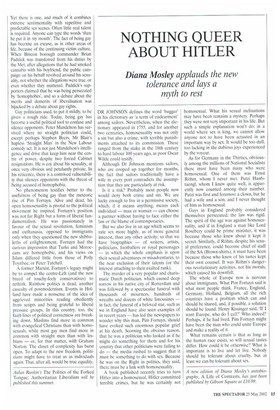NOTHING QUEER ABOUT HITLER
Diana Mosley applauds the new
tolerance and lays a myth to rest
DR JOHNSON defines the word 'bugger' in his dictionary as 'a term of endearment' among sailors. Nevertheless, when the dictionary appeared in 1755, and for another two centuries, homosexuality was not only a sin but also a crime, with terrible punishments attached to its commission. These ranged from the stake in the 18th century to hard labour 100 years ago, as poor Oscar Wilde could testify.
Although Dr Johnson mentions sailors, who are cooped up together for months, the fact that sailors traditionally have a wife in every port contradicts the assumption that they are particularly at risk.
Is it a risk? Probably most people now would deny both crime and sin. We are lucky enough to live in a permissive society, which, if it means anything, means each individual — man or woman — can choose a partner without having to face either the law or the blame of contemporaries.
But we also live in an age which seems to rate sex more highly, as of more general interest, than any other activity; so that we have biographies — of writers, artists, politicians, footballers or royal personages — in which the whole emphasis is upon their sexual adventures or misadventures, to the near exclusion of their talents (or the interest attaching to their exalted rank).
The murder of a very popular and charismatic Dutch politician, which caused deep sorrow in his native city of Rotterdam and was followed by a spectacular funeral with thousands of mourners, hundreds of wreaths and dozens of white limousines — in fact, the funeral of a beloved star, such as we in England have also seen examples of in recent years — has led the newspapers to wonder why this man, Pim Fortuyn, should have evoked such enormous popular grief at his death. Scorning the obvious reason, that he was a politician who looked as if he might do something for them and for his country that other politicians were failing to do — the media rushed to suggest that it must be something to do with sex. Because he was on the Right in politics, they said, there must be a link with homosexuality.
A book published recently tries to turn Hitler into a homosexual. Hitler committed terrible crimes, but he was certainly not homosexual. What his sexual inclinations may have been remains a mystery. Perhaps they were not very important in his life. But such a simple explanation won't do: in a world where sex is king, we cannot allow anyone not to have been actuated in an important way by sex. It would be too dull, too lacking in the dubious joys experienced by the voyeur.
As for Germany in the Thirties, obviously among the millions of National Socialists there must have been many who were homosexual. One of them was Ernst Rohm, whom I never met. Putzi Hanfstaengl, whom I knew quite well, is apparently now counted among their number. Putzi was first and foremost a clown, but he had a wife and a son. and I never thought of him as homosexual.
Gays in England probably considered themselves persecuted; the law was rigid. The spirit of the age was against homosexuality, and if in England a man like Lord Rosebery could be prime minister, it was because those who knew about it kept it secret. Similarly, if Rohm, despite his sexual preference, could become chief of staff of the SA (Brown-shirts), it must have been because those who knew of his tastes kept their own counsel. It was ROhm's dangerous revolutionary activities, not his morals, which caused his downfall.
The whole of Europe now is nervous about immigrants. What Pim Fortuyn said is what most people think, France, England, Germany, Holland, Belgium, all the rich countries have a problem which can and should be shared, and, if possible, a solution should be found. Henry Kissinger said, 'If I want Europe, who do I call?' Who indeed? Perhaps, if he had lived, Pim Fortuyn might have been the man who could unite Europe and make a reality of it.
What remains certain is that as long as the human race exists, so will sexual tastes differ. How could it be otherwise? What is important is to live and let live. Nobody should be tolerant about cruelty, but at least we can be tolerant about sex.
A new edition of Diana Mosley's autobiography, A Life of Contrasts, has just been published by Gibson Square at £10.99.






















































































 Previous page
Previous page